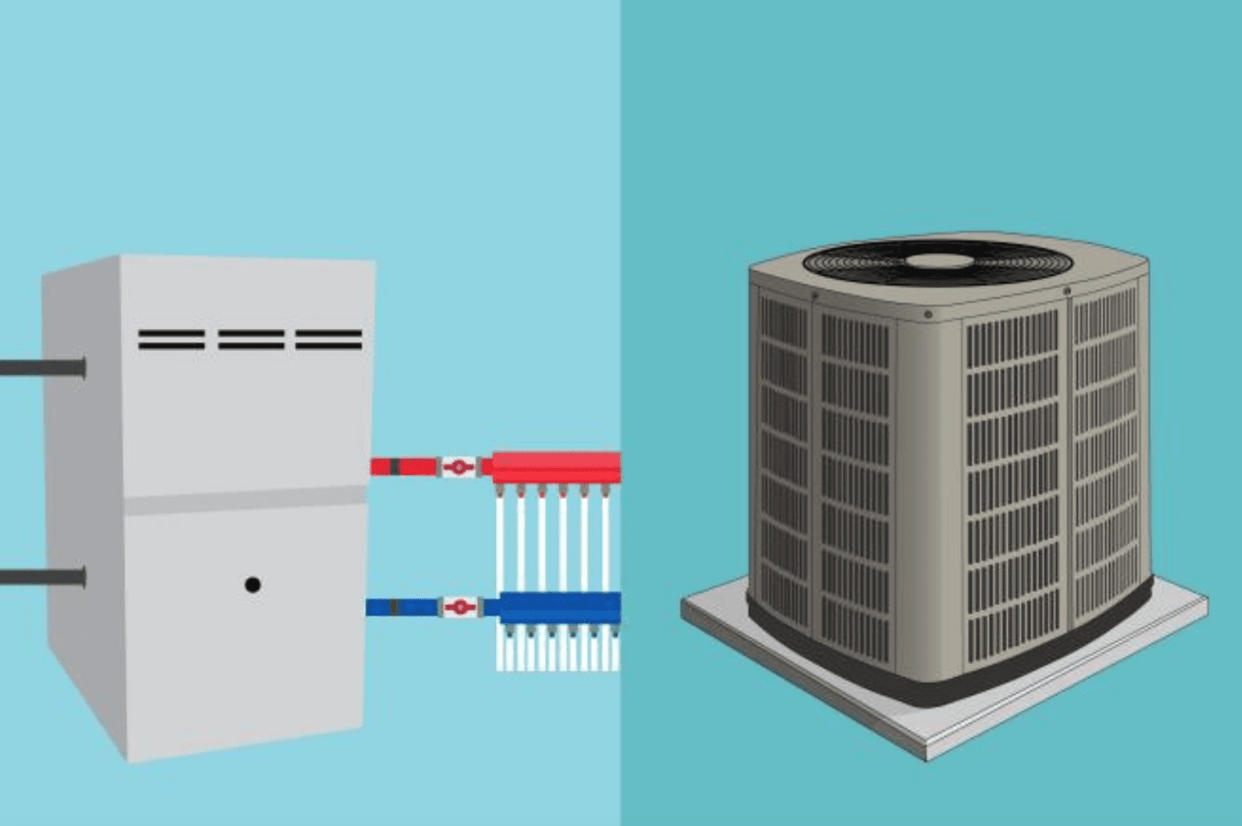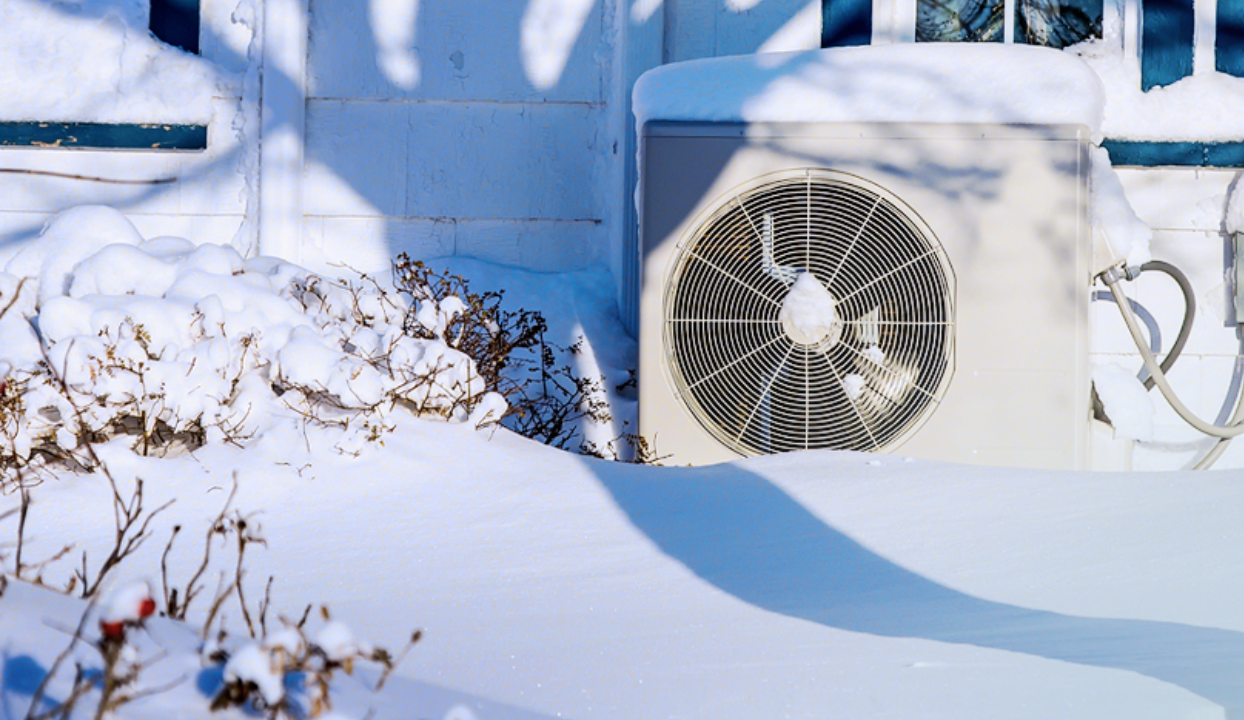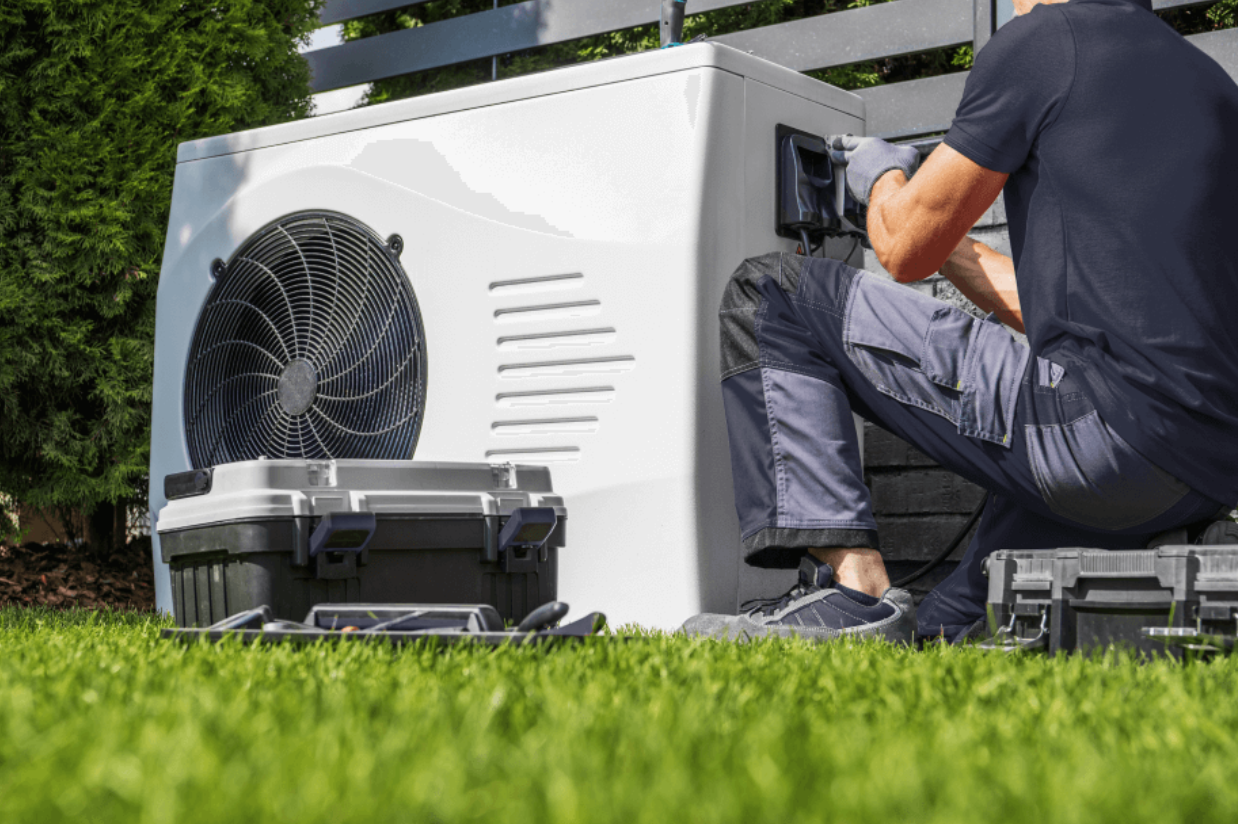Do Heat Pumps Work Better Than Furnaces in Canada?
Dan Hunter
March 25, 2025

Wondering if a standard heat pump can actually handle the harsh Canadian winter? You're not alone. In this article, I'll explain how heat pump systems work, how they stack up against traditional gas furnaces, and what you need to know about their benefits, efficiency, and overall costs, so you can decide what's the right fit for your home: Furnace or heat pump?
Key Takeaways
- Heat pump systems or electric heat pumps are energy-efficient heating systems that provide warmth in winter and cooling in summer, operating effectively even in temperatures as low as -25°C.
- While the heat pump has higher upfront installation costs compared to gas heating or a gas furnace, over time, you'll likely save on energy bills and shrink your carbon footprint.
- Government incentives and programs, such as the Canada Greener Homes Initiative, make the heat pump system more accessible and affordable for Canadian homeowners.
Understanding Heat Pumps
A heat pump system is a smart piece of modern tech. It doesn't generate heat energy; it moves it. In winter, it circulates warm air inside your home to provide heating. In summer, they flip the process and act like home air conditioners. This year-round versatility is one of their biggest selling points.
Air-source electric heat pumps are especially popular in Canada, with thousands of homes already using them.
They run on a refrigerant loop that moves heat in and out of your home, depending on the season. Some systems can even draw heat from the ground or water for added efficiency. For Canadian homeowners looking to cut down on energy bills while staying comfortable year-round, both ground source heat pumps and air source heat pumps are definitely worth considering.

Comparing Heat Pumps and Gas Furnaces
When it comes to heating your home, the choice between electric heat pumps and a natural gas furnace really depends on what works best for your local climate and budget. Understanding the difference between both heating options is crucial:
- Heat pumps are typically 2-4 times more energy-efficient than gas furnaces.
- Heat pumps utilize the outdoor warm air or cold air to provide heating and cooling.
- Gas furnaces combust fuel to generate heat.
- Because of their operation, heat pumps can significantly reduce your energy consumption and air conditioning bills.
High-efficiency natural gas furnaces are known for delivering heat rapidly and maintaining warmth during harsh winters. In places where winters are long and temperatures regularly dip well below freezing, a gas furnace might feel more reliable. This is especially true during prolonged deep freezes.
A hybrid system combining electric heat pumps and gas furnaces can optimize efficiency by switching based on temperature conditions. That's why some homeowners opt for a hybrid system, using a heat pump for most of the year and switching to a gas furnace only when the temperature drops below a certain point. It's a smart way to balance efficiency and comfort without compromising either.

Benefits of Using Heat Pumps in Canada
One of the biggest perks of switching to a heat pump is savings. Depending on your setup and energy rates, you could be looking at hundreds of dollars in reduced heating system costs each month. But it's not just about money. Heat pumps are also a win for the environment. If your electricity comes from renewable sources, your heat pump can run with almost zero emissions. That makes them a great option for cutting down on greenhouse gases and doing your part for a cleaner planet.
Heat pumps are super efficient because they generate more heat energy than the electricity they use. And in provinces where electricity is relatively cheap, running one can cost a lot less than relying on natural gas. That's why more and more Canadians are seeing them as a smart, sustainable choice for the long haul.
Performance of Heat Pump in Cold Temperatures
Modern heat pump technology is built to handle serious, cold temperatures. Many models can keep running efficiently even when temperatures dip as low as -25°C, and some can manage down to -30°C. That's thanks to advanced systems that combine innovative compressor designs and heat exchanger technology to maintain efficiency even in harsh winter conditions. This makes them a viable option for many Canadian regions that experience severe cold.
That said, like any other system, a heat pump system has its limits. When it gets really cold, think of extreme deep freeze, and you might notice a drop in performance. In those cases, having a supplemental heating system, like a heating oil furnace or a dual fuel system, helps ensure your home stays consistently warm, no matter what the weather throws at you.
What makes a cold-climate heat pump stand out is its ability to adjust to changing temperatures while still staying energy efficient. For many Canadian homeowners, that balance of comfort, reliability, and savings makes them a solid alternative to a traditional heating system.

Cost Comparison: Heat Pumps vs. Furnaces
When comparing the costs of heat pumps and natural gas furnaces, it's important to consider both the initial installation cost for the outdoor unit and the indoor unit, as well as long-term savings. The initial cost of installing heat pumps is generally higher due to their complex systems and installation requirements, ranging from around $3,500 to $20,000. On the other hand, gas furnaces typically have a lower installation cost, ranging from approximately. $2,000 to $24,000.
Despite the higher upfront costs, heat pumps are better for long-term savings. A gas furnace heating system is more affordable upfront, but the efficiency and lower operational costs of a heat pump or an electric furnace can lead to significant savings over time.
Electric heat pump installation costs typically range from approximately $8,000 to $15,000+, while furnace installation costs range from roughly $4,000 to $7,000+. For homeowners, investing in a heat pump can be seen as a long-term financial strategy. The energy efficiency, reduction in greenhouse gas emissions, and potential savings on outdoor air conditioning bills make heat pumps an attractive option despite their higher initial cost.
Installation costs can vary significantly depending on your existing system. For homes with existing ductwork, installing a heat pump may be more straightforward and cost-effective. However, if your home uses electric baseboards or lacks ducts altogether, a ductless mini-split system might be the better fit. It's also important to consider whether your current cooling system can be integrated or needs to be replaced. An energy advisor can assess how well a heat pump would work with your existing system and recommend the most efficient installation approach for your home.

Environmental Impact
Heat pumps or electric furnaces have a clear edge over traditional systems when it comes to heating your home sustainably. They produce 50–75% fewer greenhouse gas emissions than natural gas furnaces, and because they don't burn fuel. As Canada's electricity grid becomes greener, the environmental benefits of heat pumps only grow. The cleaner the power source, the cleaner the heat. The energy efficiency of variable speed heat pumps also means they consume less electricity, further reducing their environmental impact.
If you're looking for a way to reduce greenhouse gas emissions without sacrificing comfort, switching to a heat pump is a smart step in the right direction. It's a practical way to support climate goals while keeping your home cozy year-round.
Government Incentives and Rebates
Thanks to government incentives and rebates, heat pumps are becoming much more affordable for Canadian homeowners. Programs like the Canada Greener Homes Initiative are helping people offset the cost of upgrading to more energy-efficient systems. Interest-free loans and grants available under the Canada Greener Homes Initiative include:
- Interest-free loans of up to $40,000 for homeowners undertaking significant energy efficiency upgrades.
- A maximum grant of $5,600 for all eligible retrofits combined.
- Grants of up to $5,000 for air source heat pumps and cold air source heat pumps, depending on the system installed.
Specific provincial programs, such as the Home Efficiency Rebate Plus, also provide additional financial incentives for homeowners. These government rebates and incentives make heat pumps or electric furnaces more accessible and affordable, encouraging more homeowners to consider this energy-efficient heating solution.
How to Choose the Right Heating System
Picking the right heat pump isn't one-size-fits-all. Here's how to get started with making an informed decision:
- Start by assessing your heating and air conditioners requirements.
- Understand your local climate and outdoor temperature, as this influences the heating system's efficiency.
- Have an energy advisor collect data regarding your home's insulation, heating equipment, outdoor unit space, indoor unit space, and overall energy performance during the evaluation.
When considering your budget, it's important to factor in both the upfront purchase and installation costs for the heat pump and ongoing energy expenses. Maintenance costs can also differ depending on the system, with heat pumps generally requiring less upkeep than traditional furnaces. Ensuring that a heat pump is properly sized and installed is essential to maximize efficiency and energy savings, especially in colder climates. They can be effectively used as air conditioners during the summer.
SolrSolvr provides expert guidance to help homeowners compare heating and air conditioners options and make well-informed decisions. Their tailored heating reports offer specific recommendations based on your home's characteristics and preferences, helping you choose the best system.

SolrSolvr's Free Consultation Service
SolrSolvr offers free, qualified clean energy quotes to help Canadian homeowners compare heating options with confidence. Their service takes the guesswork out of the process by connecting you with multiple quotes from trusted, vetted installers. Here's how it works:
- After you submit your form, an energy advisor follows up to guide you through the next steps.
- You'll get access to a variety of quotes so you can compare pricing and system types side by side.
- The team may also schedule a home evaluation, using tools like virtual mapping and video to better understand your space.
This straightforward process is designed to help you make informed decisions about your heating needs, whether you're deciding between a heat pump and natural gas furnace or just exploring the most efficient options. With SolrSolvr's expert guidance and tailored recommendations, you'll understand how to reduce your energy usage, lower your energy costs, and choose the best system for your home.
Steps to Get Your Customized Heating Report
To get your customized heating report, simply start by filling out SolrSolvr's online form. You'll be asked to provide your contact details, information about your current heating system, and your preferences for energy efficiency. It helps to have your home's measurements and recent energy usage data on hand to make the report as accurate as possible.
Once the form is submitted, you'll receive follow-up communication, usually from an energy advisor, who may offer a detailed analysis of your home's heating needs and potential solutions. The report is tailored to your situation, highlighting the most efficient systems and technologies matching your home's layout, climate, and energy goals. It's a practical way to understand your best heating options—and how to reduce both your energy use and long-term costs.
Summary
Heat pumps are emerging as one of the smartest heating solutions for Canadian homeowners. They offer energy efficiency, lower energy costs, and a cleaner environmental footprint. Thanks to modern technology, heat pumps can operate effectively even in extreme winter temperatures. Heat pumps offer year-round comfort by providing efficient heating and cooling while helping you save energy and reduce your environmental impact.
While the upfront cost of installing a heat pump is higher than that of a traditional gas furnace, the long-term savings and reduced maintenance needs make it a worthwhile investment. Government rebates and interest-free loans, such as those offered through the Canada Greener Homes Initiative, make these systems even more accessible and affordable.
If you're considering making the switch, SolrSolvr can help simplify the process. From free consultations and tailored heating reports to multiple quotes from trusted installers, their expert guidance ensures you get a system that fits your home, your budget, and your goals. By switching to an air conditioning heat pump, you're not just upgrading your heating—you're investing in a more efficient, sustainable future for your home.
Frequently Asked Questions
Are heat pumps effective in extremely cold climates?
Yes. Modern Canada heat pumps are built to handle harsh winters and can operate efficiently at temperatures as low as -25°C to -30°C. In the coldest conditions, though, a backup heat source may be needed to maintain comfort.
How do the costs of installing heat pumps compare to gas furnaces?
Heat pumps generally have a higher upfront cost, typically ranging from $8,000 to $15,000 or more. In comparison, installing a gas furnace usually costs between $4,000 and $7,000.
What are the environmental benefits of heat pumps?
Heat pumps produce 50–75% fewer emissions than gas furnaces and don't release greenhouse gases during operation. Using a heat pump can be a major step toward a more sustainable home, especially if your electricity comes from clean energy sources.
Are heat pumps effective for both heating and cooling year-round?
Yes, modern cold-climate heat pumps are designed to deliver reliable heating and cooling even in temperatures as low as -25°C, making them a versatile solution for year-round comfort.
Are there any government incentives for installing heat pumps?
Yes. Programs like the Canada Greener Homes Initiative offer grants and interest-free loans to help cover installation costs. Some provinces also have additional rebates, making heat pumps more affordable than many people expect.
How can SolrSolvr help you choose the right heating system?
SolrSolvr makes the process easier by offering free consultations, customized heating reports, and multiple quotes from trusted local installers. Their expert support helps you choose the best system for your home, budget, and climate.



